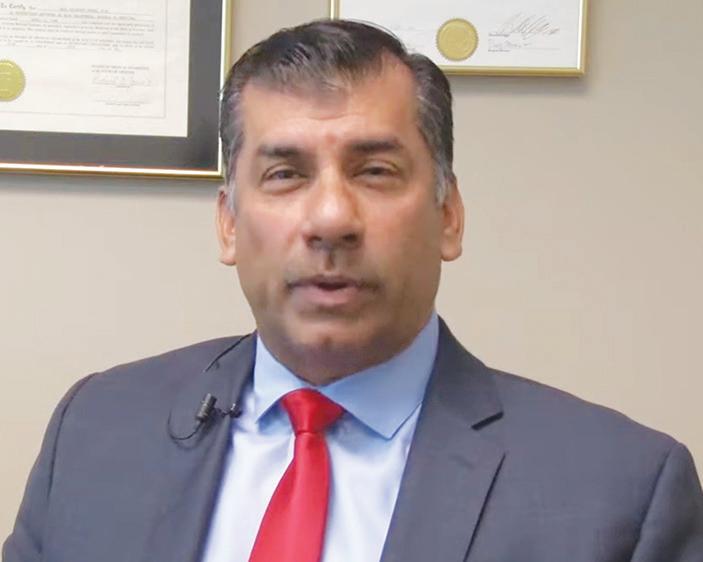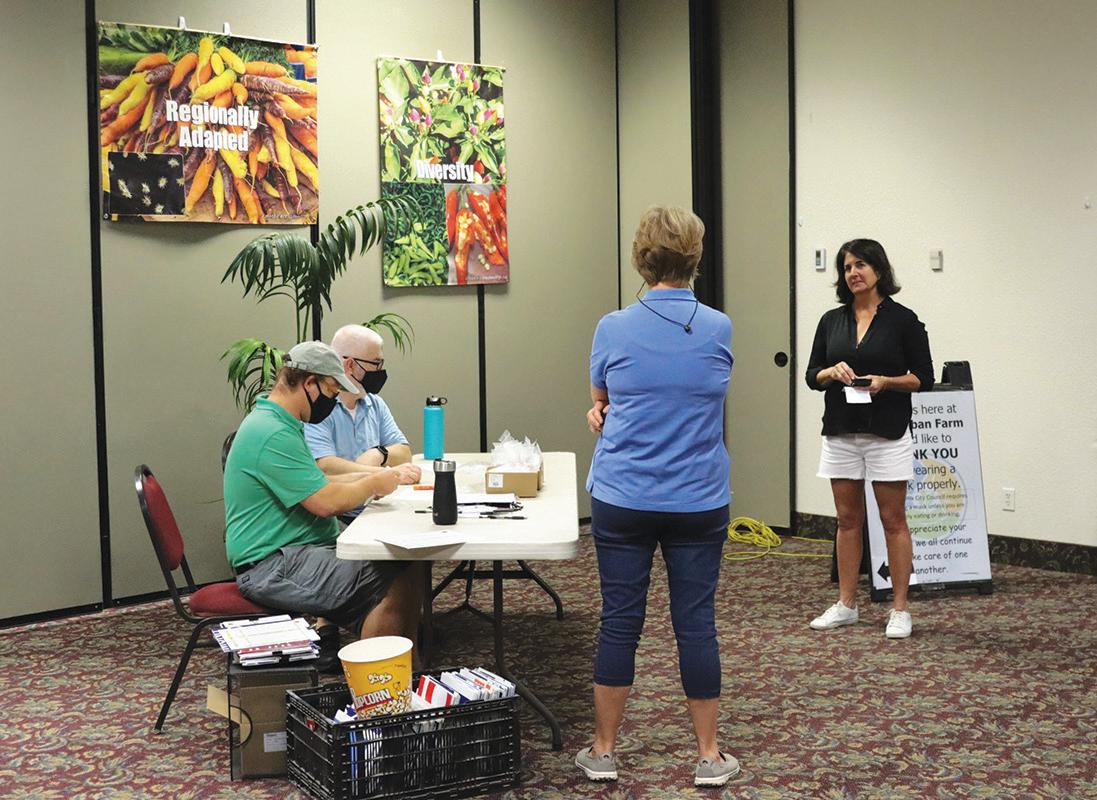
8 minute read
COMMUNITY
For more community news visit gilbertsunnews.com
GilbertSunNews.com | @GilbertSunNews /GilbertSunNews
Terros program helps expectant moms break addiction
BY ASHLYN ROBINETTE
GSN Contributor
More people in the United States died of drug overdoses in 2020 than in any one-year period.
Overdose deaths hit a record 93,000, according to the Centers for Disease Control and Prevention. That’s a nearly 30 percent increase over 2019.
Arizona wasn’t spared from the problem: the CDC predicted the number of overdose deaths in the state ending March 2021 to be 2,735, compared with 2,110 in March 2020 — another spike of nearly 30 percent.
Terros Health is working to reverse this trend.
Through a comprehensive medication-assisted treatment (MAT) program, Terros Health helps patients on the road to recovery with an emphasis on a special population: expectant mothers.
“I can honestly say this saved my life because I overdosed twice on heroin…,” said Denisse Pesqueira, new mother and Terros Health patient. “God gave me two chances back and I’m grateful that I took this medication and met Dr. (Saul) Perea.”
About nine years ago, Pesqueira, 36, broke her leg in an automobile accident. It was then that she began taking painkillers, which eventually led to an addiction to heroin.
Last December, Pesqueira learned that she was pregnant and worried how her substance use disorder would affect her unborn baby.
Pesqueira was introduced to Terros Health and after receiving specialized MAT throughout her pregnancy, she recently gave birth to a healthy baby girl. The baby showed no signs of withdrawal. “I have a daughter and I got my other daughter back,” the Phoenix resident said. “I’ve been clean and successful. I work and have no cravings. I take my meds there, they have therapy there and I can honestly say this is the best thing. The program is the best thing if you really want help getting off of drugs.”
Dr. Saul Perea, Terros Health’s chief medical officer, created the MAT program. He works hand-in-hand with patients, their families and, in the case of pregnant women who are addicted to substances, OB-GYN specialists to coordinate integrated and behavioral care.
Terros Health has offered substance use treatments for many years but the MAT program didn’t officially begin until approximately six years ago, Perea said.
This program addresses patients’ overall health by combining FDA-approved medications with behavioral therapy and primary medical care.
“The MAT service started with a vision of providing services to every single opioid use disorder person,” Perea said. “We had great success with the general public and then we noticed that our pregnant women and adolescents were part of the population that weren’t getting the treatment that they needed.”
Statewide, there aren’t many programs that specialize in the treatment of substance abuse in pregnant women, so Terros Health fills that gap, Perea said.
“A lot of pregnant women still suffer from discrimination and stigma, not only from their own families, but from medical providers, and that’s unfortunate,” he said.
“But we’re doing the best we can to educate people and make sure that they
Dr. Saul Perea, Terros Health’s chief medical officer, created the medication-assisted treatment program. (YouTube)
see TERROS page 21
Pandemic grew interest in home gardening
BY DIANA QUINTERO
Cronkite News
If you tried your hand at growing your own vegetables during the past year, you aren’t alone. Home gardening has taken off since the pandemic threatened food security and forced millions of Americans to stay home. According to a survey by nationwide supplier Bonnie Plants, more than 20 million Americans took up gardening for the first time in 2020.
Last month at the Great American Seed Up in Phoenix, more than 400 Arizona gardeners looked for the perfect seeds. The event, which started in 2015, was live for the first time since the pandemic was declared in March 2020.
Janice Norton, manager of the event, said the surge in interest in gardening over the past 18 months has been astounding.
“It was unbelievable; it was astronomical in my mind,” she said.
“COVID hit everyone differently, but in the gardening world, it was transformative, to how many people finally realized that their food is important, and they wanted to be able to access healthy food and not rely on food that was maybe not going to show up at the grocery store with our supply system that was interrupted.”
The increased interest in gardening may also have been due to people simply having more time at home. Some people may have considered growing their own food in the past but were too busy, but COVID-19 forced people to spend more time at home.
Shortages and supply chain issues during the national emergency have played a role in the trust individuals have in our food systems.
“We’ve got, what, 36 hours’ worth of food in the local Safeway? That’s how quickly they turn over their inventory,” said Bill McDorman, co-founder of Great American Seed Up. “If any supply lines are cut, we have a Safeway with no food. What do we do? Now we don’t even have seeds.”
McDorman has worked directly with seeds for over 40 years. He says that most of the food produced in the state comes from seeds that aren’t native. At the Great American Seed Up, the goal is to get thousands of people to save and regenerate
understand and that we give the treatment that these women deserve.”
Terros Health’s trained medical experts, counselors and community health workers use two medication-assisted treatment options: Suboxone and Subutex.
Suboxone can reduce or eliminate withdrawal symptoms and drug cravings without producing the dangerous side effects of opioids. Pregnant women struggling with substance use are given Subutex to help keep themselves and the baby safe while decreasing substance cravings.
“This is actually the only thing that really helps with cravings,” Pesqueira said.
Great communication between patients and providers is especially important during treatment, Perea said.
To achieve this, Terros Health has partnered with NextGen Healthcare, a leading provider of ambulatory-focused technology solutions.
“We provide a lot of the underlying technology that gets used in a lot of medical practices but it’s folks like Dr. Perea… who are doing the hard work,” said Dr. Robert Murry, NextGen chief medical information officer and practicing physician. “We’re just trying to be behind the scenes to let them do their job.”
Terros Health integrates patients’ medical and behavioral health data into a single system using an electronic health records platform called NextGen Enterprise with NextGen Virtual Visits.
This gives clinicians access to a patient’s health record to improve efficiencies and coordination of care, reduce administrative errors and promote total health and well-being.
For expectant mothers, the NextGen system enables Terros Health to work with OB-GYN specialists to care for patients who are deemed high-risk pregnancies.
“Every pregnant woman becomes highrisk,” Perea said. “So communication and coordination of care is really, really important. Being available through tele-
ANSWERS TO PUZZLES ON PAGE 29


see TERROS page 23

Meet the artists and discover new art!
Pick up your artist’s directory or go online to plan your free self-guided artist studio tour. Visit 45 studios featuring 191 artists in diverse mediums.
Nov. 19, 20, 21 & Nov. 26, 27, 28, 2021 Friday, Saturday & Sunday, 10am–5pm Cave Creek • Carefree North Scottsdale 480.575.6624 Hidden In The Hills.org

native and non-native seeds.
“In the industry itself, of being able to do your own gardening, there is a wonderful interest and a lack of knowledge,” said Belle Starr, who helped coordinate the event. “We’re trying to bridge that gap by giving education, as well, and being able to give a start up to growing your own seeds.”
However, even before COVID-19, home gardening was growing steadily in popularity.
“Two years ago, actually, it started with the millennials,” McDorman said. “We saw the biggest bump in new people wanting to garden in demographic history.”
The Bonnie Plants survey in May found that in the previous year, 30 percent of people planning to grow their own food were gardening for their first time, and 65 percent of those said COVID-19 was the main reason.
As the country reopens and people head back to work, away from their gardens, the trend could wither. However, Great American Seed Up organizers are optimistic that the pandemic hobby has taken root.
“This just showed that people have the interest, and when they’re at home, they have the time, they will take it up,” said Michael Chamberland, assistant agent at the University of Arizona Maricopa County Cooperative Extensions.


Volunteers sign in home gardeners looking to buy seeds at the Great American Seed Up
last month in Phoenix. (Sierra Alvarez/Cronkite News) health and having all the clinical information that we need at our fingertips with NextGen just makes our life a lot easier.”
Terros Health offers in-person appointments as well as video visits so patients can meet virtually with a provider from the comfort of their home. MAT providers are also available at the company’s 27th Avenue Health Center in central Phoenix and the Olive Health Center in Glendale.
The company also has mobile crisis capabilities, meeting people anywhere in Maricopa County if they are having a mental health crisis.
The cost of treatment may be covered by Arizona Health Care Cost Containment System (AHCCCS), Arizona’s Medicaid agency, private insurance or through federal grant funding.
For more information, visit terroshealth.org/MAT.
GetConnected
facebook.com/getoutaz





